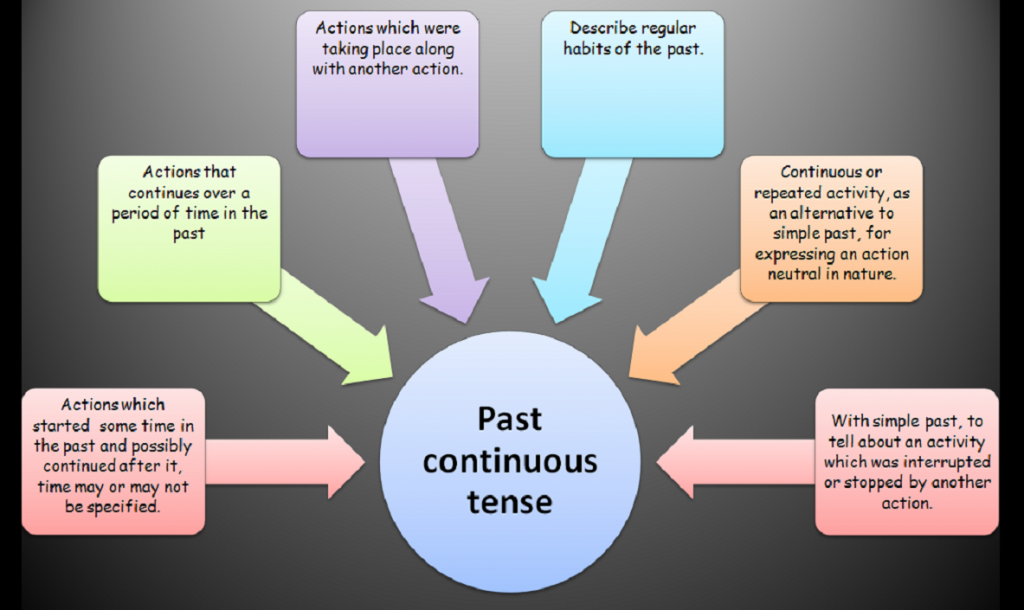She Continued to Lay in the Dark Grammar
6 Simple Past and Past Continuous
Simple Past and Past Continuous
Annapurna Madhuri
The past continuous or the past progressive tense is used to tell about some action happening at some time in the past. The time of happening of the action/event may or may not be specified.
Any temporary action, and/or an incomplete action happening in the past is expressed in the past continuous tense.
The verb in the past continuous tense is made of two parts:
- The past tense form of verb 'to be' – was/were
- 'ing' form of the base verb.
Sentences in the past continuous form have a specified structure:
The affirmative sentence structure
subject + past tense form of verb 'to be' + base verb+ing
Example: She (subject)+ was (past tense form of 'to be')+ sing (base-verb)+ing ==> She was singing.
Negative sentence structure:
subject+ past tense form of verb 'to be' + not + base verb + 'ing'
Example: She was not singing
Interrogative structure:
Past tense form of verb 'to be' + subject + base verb + ing + Question tag
Example: Was she singing?
Recap of simple past tense:
Knowledge of past continuous tense:
At the end of this chapter, all learners will be able to
-
- Use past continuous tense form of the verb to show actions happening in the past
- Know the sentence structures in each of the sentence forms.
- Construct sentences in past continuous tense in affirmative, interrogative and negative forms.
Given below is an account of a day in some time in the past. Read carefully and note the usage of verbs in the paragraph.
The last few months were so hectic. I was doing so many things all at the same time. I was planning to go to the mall with my friend Sadhana. We were always looking forward for the opportunity to go out together. As we were going to the mall, my car broke down. We were standing by the side of the road. We were waiting for the mechanic. When we were returning home from the garage, it started raining. We reached home completely drenched. It was raining for the rest of the day. Since, we could not go out, Sadhana and I were playing cards at home. We were feeling tired of being at home. So, we planned to cook our favourite food. We were cooking food, when the phone rang. Sadhana's mother was calling. She was coming to pick up Sadhana from my home. She was bringing some ice-cream for us to eat. It was still raining outside, while we were enjoying our ice-cream at home. After a while, the rain stopped and Sadhana went home with her mother. We were having a great time together.
In the above paragraph, we see usage of past continuous tense in various situations. Let us now discuss.
The situations in which past continuous tense is used:
- To indicate actions which started some time in the past and possibly continued after it; time may or may not be specified.
- Example: I was planning to go to the mall with my friend Sadhana. (time unspecified) It was raining for the rest of the day. (time specified)
- To talk about actions that continue over a period of time in the past.
- Example: We were waiting for the mechanic.
- To tell about actions which were taking place along with another action.
- Example: It was still raining outside, while we were enjoying our ice-cream at home.
- To describe regular habits of the past.
- Example: We were always looking forward to the opportunity to go out together.
- Continuous or repeated activity, as an alternative to simple past, for expressing an action neutral in nature.
- Example: We were feeling tired of being at home. /We felt tired of being at home.
- With simple past, to tell about an activity which was interrupted or stopped by another action.
- Example: We were cooking food, when the phone rang.
- As we were going to the mall, my car broke down.
Please note: Words such as as, when, while are used to link two actions taking place in a given situation.
Exercise: Choose the correct form of the verb and complete the sentences:
Summing up

Signal words: while, when, as
Exercise: Read each sentence carefully and use the correct form of verb as per the signal words, to complete the sentences.
Interrogative sentences:
Negative sentences:
Choose the correct form of verb, to fill in the blanks with suitable forms of verbs given in the bracket:
Make sentences from the jumbled words
Source: https://kpu.pressbooks.pub/effectiveenglish/chapter/simple-past-3/
0 Response to "She Continued to Lay in the Dark Grammar"
Postar um comentário